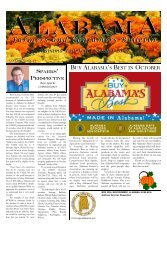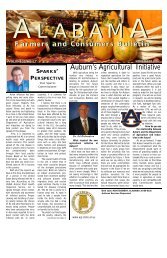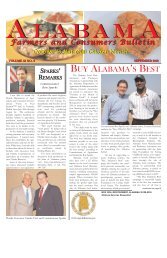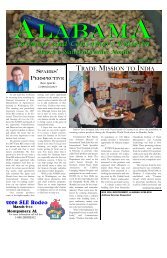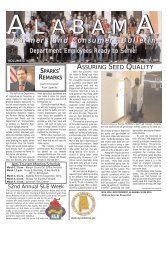Lessons Learned from Rural Schools - Alabama Department of ...
Lessons Learned from Rural Schools - Alabama Department of ...
Lessons Learned from Rural Schools - Alabama Department of ...
Create successful ePaper yourself
Turn your PDF publications into a flip-book with our unique Google optimized e-Paper software.
LLS-0010 <strong>Lessons</strong> <strong>Learned</strong>_Pub.qrk: 4/25/09 3:02 PM Page 23<br />
d. Language and slogans—the use <strong>of</strong> terms or<br />
metaphors that depict what people in that organization value<br />
and how they view things.<br />
Most <strong>of</strong> the schools studied have strong cultures in that most<br />
stakeholders hold many <strong>of</strong> the same values and beliefs, and<br />
display the adopted behaviors. Many cultural items were observed<br />
during visits and many items were mentioned during<br />
interviews. Some were:<br />
• Many signs about success were posted throughout the<br />
schools, and many comments about high expectations were<br />
given. “Welcome to success—Failure is not an option.” “We<br />
give them dreams.” “We expect success.”<br />
• Information about rituals and ceremonies were shared by<br />
parents and school personnel. Pep rallies and motivational<br />
speeches for testing, parties celebrating wins, schools celebrating<br />
diversity, bulletin boards celebrating excellence, news articles<br />
sharing these items with the community, trips for reaching<br />
goals, and so forth, were done to further the mission or vision<br />
<strong>of</strong> the school.<br />
• Many stories were shared by parents and teachers regarding<br />
the impact <strong>of</strong> school activities on the community and viceversa.<br />
Stories <strong>of</strong> teacher, principal, parent and student effort<br />
were noted. “The parents <strong>of</strong> a child might be in jail, but they<br />
want their kids to do better.” “We have country kids, good kids,<br />
they are disciplined, their values are different <strong>from</strong> city kids.”<br />
Some communities referred to family values as important in<br />
their schools. Others felt that religion was an important part <strong>of</strong><br />
their community and had an impact on discipline and motivation<br />
<strong>of</strong> their children.<br />
So What? Every school should have an articulated vision<br />
that is reinforced through stories, symbols, ceremonies, and slogans.<br />
Examine values and behaviors and employ the best motivational<br />
strategies for all stakeholders.<br />
Leadership versus Management<br />
Some comments <strong>from</strong> teachers and principals raised questions<br />
regarding the leadership vs. management issue. Is there a<br />
difference between leadership and management? Can a person<br />
be a manager and a leader at the same time? Are we developing<br />
over managed and under led schools?<br />
Accountability in education has done some great things, and<br />
there are reasons it was needed. But is it a possibility that it is<br />
causing us to select, train, and develop a generation <strong>of</strong> managers<br />
instead <strong>of</strong> leaders?<br />
The following are representative <strong>of</strong> comments that indicated<br />
that some schools are over managed and under led.<br />
<strong>Lessons</strong> <strong>Learned</strong> <strong>from</strong> <strong>Rural</strong> <strong>Schools</strong> – May 2009<br />
Teachers<br />
“Don’t have time to teach”<br />
“They (State <strong>Department</strong> <strong>of</strong> Education) doesn’t know what<br />
my children need”<br />
Principals<br />
“Too busy filling out paperwork”<br />
“Don’t have time…to plan”, “to do what needs doing.”<br />
Many business writers and researchers see a difference in<br />
leadership and management functions. Most would not see<br />
them as mutually exclusive or one as superior to the other.<br />
Most recognize the importance <strong>of</strong> both in successful organizations.<br />
The following is a short list to describe some <strong>of</strong> the differences<br />
in function between the two. The list is intended for<br />
thought and debate in the context <strong>of</strong> improving the performance<br />
and effectiveness <strong>of</strong> schools.<br />
Managers: Leaders:<br />
Maintain status quo Provide new direction<br />
Do things right Do right things<br />
Develop a policy to follow Develop a better solution<br />
Plan and budget Establish a vision<br />
Organize and staff Align people<br />
Control and problem solve Motivate and inspire<br />
Produces a degree <strong>of</strong> predictability<br />
and order and has the potential<br />
to produce extremely short term<br />
results expected by stakeholders. (3)<br />
Management philosophy<br />
Do the status quo thing–conclude report, manage details,<br />
put structure to report, pat ourselves on back, maintain test<br />
scores and momentum, and so forth.<br />
Leader philosophy<br />
Think beyond report, rethink vision, inspire and challenge<br />
all <strong>of</strong> us to get better, wake up in middle <strong>of</strong> night because you<br />
can’t get it <strong>of</strong>f your mind, write down your thoughts, spend<br />
time in reflection, make things happen, and so forth.<br />
References<br />
Produces change, <strong>of</strong>ten to<br />
a dramatic degree and has<br />
the potential to produce<br />
useful change<br />
1. Effective Management, 3 e, by Chuck Williams, South-Western, 2008.<br />
2. Leadership, 2 e, by Robert Lussier & Christopher Achua, South-Western, 2004.<br />
3. Leadership, 6e, by Richard Hughes, Robert Ginnett, and Gordon Curphy, 2009.<br />
4. Leading Change, by John Kotter, Harvard Business Press, 1996.<br />
5. Management <strong>of</strong> Organizational Behavior, 7th edition, by Paul Hersey, Kenneth H. Blanchard,<br />
and Dewey E. Johnson, Prentice Hall, 1996.<br />
23



